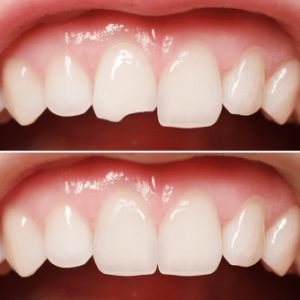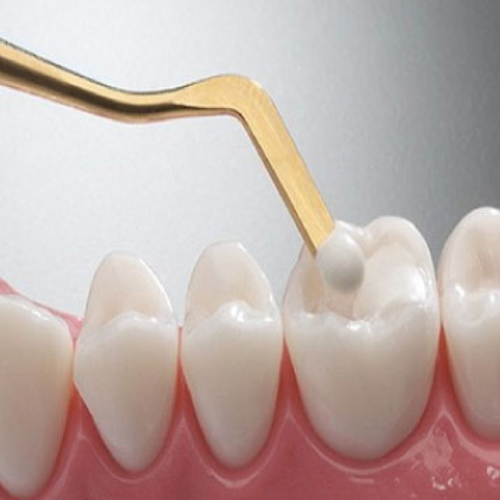About Tooth color filling
Tooth color fillings, also known as composite resin fillings, offer a modern and aesthetically pleasing solution for repairing cavities or minor tooth damage. These fillings are crafted from a composite material that blends seamlessly with the natural color of your teeth, making them an ideal choice for visible areas of your smile.
Symptoms of Tooth color filling
- Tooth Sensitivity
- Visible Cavities
- Toothache
- Cracks or Chips
- Broken Fillings
- Discoloration
- Pain When Chewing
- Gum Recession
- Uneven Tooth Surface

Causes of Tooth color filling
- Dental Cavities: The most common reason for tooth color fillings is to treat cavities caused by tooth decay. Bacteria in the mouth produce acids that erode the tooth enamel, leading to decay and the formation of cavities.
- Chipped or Cracked Teeth: Teeth can become chipped or cracked due to trauma, biting hard objects, or other forms of damage. Tooth color fillings can repair these defects, restoring the tooth’s structure and function.
- Worn Down Teeth: Over time, teeth can become worn down due to bruxism (teeth grinding), aggressive brushing, or natural wear and tear. Fillings can help rebuild the lost tooth structure.

Our Tooth color filling Treatment Options:
- Composite Resin Fillings
Composite resin fillings are the most common type of tooth color filling. Made from a blend of plastic and fine glass particles, these fillings are applied in layers and cured with a special light. Composite resin can be precisely matched to the color of your natural teeth, making it ideal for filling cavities and repairing minor damage in visible areas. This material is durable and bonds well to the tooth structure, providing both aesthetic and functional benefits. - Glass Ionomer Fillings
Glass ionomer fillings are another option for tooth color restorations. Made from a glass and acid-based material, these fillings release fluoride, which helps protect the tooth from further decay. Glass ionomer fillings are often used for areas where there is less stress on the filling, such as in the root areas of teeth. They are also suitable for patients who may have difficulty maintaining optimal oral hygiene. - Resin Ionomer Fillings
Resin ionomer fillings combine the properties of glass ionomer with added resins for improved strength and wear resistance. These fillings are suitable for areas with moderate stress and offer a good balance of durability and aesthetic appeal. They also provide fluoride release to help protect the tooth.
When You Need
Tooth Color Filling Treatment



Dental Cavities:
- Decay: If you have cavities, a tooth-colored filling can restore the affected tooth while matching its natural color.
Chipped or Cracked Teeth:
- Minor Damage: For small chips or cracks, a tooth-colored filling can repair the damage and improve the tooth’s appearance and function.
Fractured Fillings:
- Replacing Old Fillings: If an existing filling has become damaged or discolored, replacing it with a tooth-colored filling can restore both function and appearance.
Frequently Asked Questions
Tooth color fillings are durable and can last between 5 to 10 years, depending on factors such as the location of the filling, your oral hygiene practices, and the amount of stress placed on the filling. Regular dental check-ups can help ensure the longevity of your fillings.
Tooth color fillings offer a significant advantage in terms of aesthetics because they blend seamlessly with the natural color of your teeth. They also bond well to the tooth structure, which can preserve more of the healthy tooth material compared to metal fillings. However, metal fillings can be more durable in certain situations, so the choice depends on individual needs and preferences.
Tooth color fillings require the same care as natural teeth. It is important to maintain good oral hygiene by brushing twice a day, flossing daily, and visiting your dentist regularly. Avoiding hard foods and practices such as grinding your teeth can help prevent damage to the fillings.
Yes, tooth color fillings can be used for large cavities, but for extensive damage, your dentist might recommend indirect fillings such as inlays or onlays. These are custom-made and offer greater durability for larger restorations.
24 / 7 HOURS SERVICE
